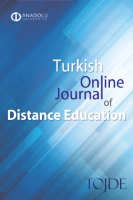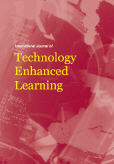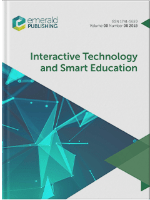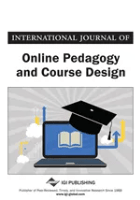
Turkish Online Journal of Distance Education
Scope & Guideline
Exploring New Frontiers in Distance Learning.
Introduction
Aims and Scopes
- Distance Education Methodologies:
The journal focuses on diverse methodologies in distance education, including blended learning, online learning, and innovative instructional models such as flipped classrooms and gamification. - Technology Integration in Education:
A core area of research is the integration of technology in educational settings, exploring how digital tools and platforms can enhance learning outcomes and teaching effectiveness. - Assessment and Evaluation:
TOJDE addresses assessment practices in online education, including automated evaluations, feedback mechanisms, and the effectiveness of various assessment types in measuring learner progress. - Student Engagement and Experience:
Research on student engagement, motivation, and learning experiences in distance education is a significant focus, highlighting factors that contribute to student success and retention. - Inclusivity and Accessibility:
The journal promotes research on accessibility in education, emphasizing the importance of inclusive practices and technologies that support diverse learners, including those with disabilities. - Pedagogical Innovations:
TOJDE showcases innovative pedagogical practices that leverage digital technologies to improve teaching and learning processes, fostering creativity and critical thinking among students.
Trending and Emerging
- Artificial Intelligence and Automation in Education:
Increasingly, research is focusing on the use of AI technologies, such as chatbots and automated feedback systems, to enhance educational experiences and provide personalized learning opportunities. - Social and Emotional Learning (SEL) in Online Contexts:
There is a notable rise in studies addressing the importance of social and emotional learning within online educational environments, particularly in relation to student well-being and community building. - Impact of COVID-19 on Distance Education Practices:
The pandemic has catalyzed a wealth of research examining its effects on distance education, including shifts in teaching strategies, learner engagement, and institutional responses. - Gamification and Interactive Learning:
Gamification strategies are becoming increasingly popular in distance education research, with studies exploring their effectiveness in enhancing learner motivation and engagement. - Personalized Learning Approaches:
There is a growing emphasis on personalized learning models that cater to individual student needs, highlighting adaptive learning technologies and tailored educational experiences. - Digital Literacy and Skills Development:
Research is increasingly focusing on the development of digital literacy skills among learners, addressing the competencies needed to thrive in online learning environments.
Declining or Waning
- Traditional Classroom Comparisons:
There has been a noticeable decline in studies comparing traditional classroom settings with online learning environments, as the focus shifts towards more integrated and hybrid approaches. - General Educational Technology:
Research that broadly addresses educational technology without specific applications or contexts has decreased, reflecting a trend towards more specialized and targeted studies. - Historical Perspectives on Distance Education:
Papers focusing on historical analyses of distance education methods and their evolution are less common, indicating a shift towards contemporary practices and future-oriented research.
Similar Journals

International Journal of Technology Enhanced Learning
Shaping Tomorrow's Education through Technological AdvancementsInternational Journal of Technology Enhanced Learning, published by INDERSCIENCE ENTERPRISES LTD, is a premier scholarly journal that comprehensively explores the intersection of technology and education, fostering innovative approaches to enhance learning processes. Established in 2008 and continuing through 2024, the journal is pivotal for researchers, educators, and technology professionals aiming to disseminate and engage with cutting-edge developments in technology-enhanced learning environments. With an admirable ranking in Scopus—placing in the 72nd percentile of Education and 49th in Computer Science Applications—the journal reflects a robust influence in the fields of Computer Science Applications and Education, as evidenced by its Q2 and Q3 quartile rankings. The journal not only provides a platform for empirical research and theoretical discourse but also emphasizes practical implementations in e-learning. Although it does not offer open access, its curated collection of articles serves as a vital resource for scholars and practitioners who are dedicated to advancing the nexus of technology and education.

Interactive Technology and Smart Education
Innovating education: where technology meets pedagogy.Interactive Technology and Smart Education is a leading academic journal published by EMERALD GROUP PUBLISHING LTD, dedicated to exploring the dynamic intersection of technology and education. With a robust impact factor signifying its significant contributions to the field, this journal consistently ranks in the Q1 quartile in categories such as Computer Science (Miscellaneous), Education, and E-learning, reflecting its prestige and wide-ranging influence. A staple for researchers, educators, and industry professionals, the journal addresses innovative practices and developments in interactive technologies that enhance teaching and learning experiences. Operating from its base in the United Kingdom, the journal spans nearly two decades of impactful publishing, featuring high-quality research that plays a crucial role in shaping the future of education through technology. Scholars seeking to stay at the forefront of this evolving field are encouraged to contribute and engage with the journal's pioneering work.

Open Praxis
Elevating educational practices with rigorous research insights.Open Praxis, published by the International Council for Open and Distance Education, is a premier open-access journal dedicated to advancing the field of open and distance education. With its ISSN 2304-070X and E-ISSN 2304-070X, Open Praxis has been providing a platform for rigorous research and innovative practice since 2013, catering to an expanding audience of researchers, educators, and policy-makers interested in the latest advancements in educational methodologies and technologies. The journal is indexed in Scopus, achieving impressive rankings within both the Library and Information Sciences (Rank #72/280, Percentile 74th) and Education (Rank #453/1543, Percentile 70th) categories, highlighting its significant impact in the academic community. Operating under a commitment to open access principles, Open Praxis facilitates knowledge dissemination and collaboration, making vital research accessible to a global audience. Scholars aiming to stay at the forefront of open and distance learning are invited to engage with this journal, which serves as a critical resource for emerging trends, challenges, and solutions in education.

Technology Knowledge and Learning
Exploring New Frontiers in Learning and TechnologyTechnology Knowledge and Learning, published by SPRINGER, stands as a pivotal platform in the realms of computational theory, computer science, education, and human-computer interaction. With an impressive impact factor reflecting its reputation, this journal has consistently ranked in the Q1 quartile across multiple categories as of 2023, including Computational Theory and Mathematics, Education, and Engineering. Spanning a timeline from 2011 to 2024, it serves as an essential resource for those engaged in exploring the intersections of technology, pedagogy, and knowledge transfer, thereby facilitating advancements in both theory and practical applications. Although it is not an open-access journal, the rigorous peer-review process ensures that only the highest quality research contributes to its esteemed reputation. By providing a platform for innovative research and discussions, Technology Knowledge and Learning plays a crucial role in shaping the future of technological education and applications, making it an invaluable resource for researchers, professionals, and students alike, seeking to stay at the forefront of this dynamic field.

RIED-Revista Iberoamericana de Educacion a Distancia
Transforming Education Across BordersRIED-Revista Iberoamericana de Educacion a Distancia is a premier academic journal dedicated to the dynamic field of distance education, published by the ASOCIACION IBEROAMERICANA EDUCACION SUPERIOR & DISTANCIA - AIESAD. Established in 1998 as an Open Access journal, it provides a valuable platform for researchers, educators, and practitioners to disseminate and access cutting-edge research and innovative practices in distance learning. With its ISSN 1138-2783 and E-ISSN 1390-3306, RIED ranks within the top 2nd Quartile (Q2) in both Computer Science Applications and Education as of 2023, showcasing its significant impact and relevance in academia. Positioned in Spain, the journal not only serves the Ibero-American educational community but also contributes to the global discourse on online education methodologies and technologies. With an impressive Scopus ranking in the 92nd percentile for Social Sciences (Education) and 77th percentile for Computer Science (Computer Science Applications), RIED is essential for those seeking to advance their understanding and expertise in the realm of distance education.

International Journal of Online Pedagogy and Course Design
Transforming online learning experiences.The International Journal of Online Pedagogy and Course Design, published by IGI Global, serves as a vital resource for researchers, educators, and practitioners interested in the integration of technology in education. Since its inception in 2017, this journal has focused on the latest advancements in online teaching methodologies, course design, and assessment frameworks, contributing to the dynamic field of educational technology. It is indexed in Scopus and currently ranks Q4 in the Education category, reflecting its growing influence within the academic community. The journal provides an invaluable platform for sharing innovative research and practical insights that enhance online learning experiences, crucial in today’s digitally-driven educational landscape. With an ISSN of 2155-6873 and E-ISSN of 2155-6881, the journal is dedicated to fostering a collaborative environment where ideas and practices in online pedagogy can thrive.

BMC Medical Education
Empowering educators to shape the future of healthcare.BMC Medical Education is a prestigious journal published by BMC, focusing on the intricate interplay between medicine and education. Established in 2001 and based in the United Kingdom, this open access journal aims to enhance the understanding and practice of medical education across the globe. With its impact factor and strong rankings, including a Q1 classification in both Education and Medicine (miscellaneous) categories, it is recognized as a leading platform for innovative research, education strategies, and best practices in medical training. BMC Medical Education is indexed in Scopus, holding an impressive rank of #104 in General Medicine and #279 in Social Sciences - Education, underscoring its significance in the academic community. Researchers, educators, and students in medical and educational fields will find invaluable resources and insights that contribute to the ongoing development of effective medical training programs. Access to this extensive body of work is freely available, fostering a collaborative environment for advancing education in healthcare.

Eurasian Journal of Educational Research
Exploring diverse educational landscapes and practices.The Eurasian Journal of Educational Research, published by ANI YAYINCILIK, is a distinguished platform dedicated to advancing the field of education since its inception in 2008. Operating under a robust commitment to open access principles, this journal facilitates the dissemination of high-quality research and innovative practices across diverse educational domains. With an ISSN of 1302-597X and an E-ISSN of 2528-8911, it serves as a significant resource for educators, researchers, and policymakers within the academic community. Holding a Q3 rating in Education for the year 2023, and ranked 792 out of 1543 within the Scopus database, the journal exemplifies its commitment to enhancing educational outcomes across Eurasia. The Eurasian Journal of Educational Research aims to publish original research, systematic reviews, and insightful perspectives that contribute to the ongoing discourse in educational research, policy, and practice. Based in Ankara, Turkey, it also emphasizes the importance of regional studies and their implications on global educational trends, thus enriching the academic landscape with localized knowledge while fostering international collaborative networks.

Smart Learning Environments
Revolutionizing education with cutting-edge insights.Smart Learning Environments, published by Springer Heidelberg, is a leading open-access journal dedicated to advancing the field of educational technology and intelligent learning systems. Since its inception in 2014, this journal has established itself as a vital resource for researchers and practitioners, showcasing innovative interdisciplinary approaches that enhance learning experiences using smart technologies. With a notable impact factor and recognition in the top quartiles (Q1) of both Computer Science Applications and Education, it ranks within the top 2% of journals in the Social Sciences – Education category and the top 7% in Computer Science, according to Scopus. The journal's scope encompasses empirical studies, theoretical papers, and reviews, making it an essential platform for disseminating cutting-edge research. Researchers, educators, and technology professionals are encouraged to engage with this premier outlet, which not only facilitates access to high-quality research but also promotes collaboration across academic and professional spheres.

Journal of E-Learning and Knowledge Society
Navigating the Evolving Landscape of Digital EducationJournal of E-Learning and Knowledge Society is a premier academic journal dedicated to the exploration and advancement of e-learning and knowledge dissemination in contemporary society. Published by the SOC ITALIANA E-LEARNING, this journal has established itself as a vital resource for researchers and practitioners since its inception in 2006. With an open access model adopted in 2007, the journal promotes the free exchange of ideas and research findings, ensuring wide accessibility to academic contributions in this rapidly evolving field. The journal is indexed in notable databases and holds a Q3 classification in both Computer Science Applications and Education, reflecting its significant role in the advancement of educational technologies. Furthermore, its Scopus ranks highlight its relevance within the educational and computer science communities. Based in Rome, Italy, the Journal of E-Learning and Knowledge Society aims to bridge the gap between theory and practice, providing a platform for innovative research that shapes the future of digital learning environments. Whether you are a researcher, educator, or student, this journal offers valuable insights and developments in e-learning that are critical to navigating today’s knowledge society.